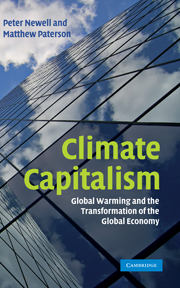Book contents
- Frontmatter
- Contents
- Preface
- Acknowledgements
- List of abbreviations
- 1 Introducing climate capitalism
- 2 Histories of climate, histories of capitalism
- 3 Climate for business: from threat to opportunity
- 4 Mobilising the power of investors
- 5 Searching for flexibility, creating a market
- 6 Caps, trades and profits
- 7 Buying our way out of trouble
- 8 The limits of climate capitalism
- 9 Governing the carbon economy
- 10 What futures for climate capitalism?
- Conclusions
- Glossary
- Index
- References
Conclusions
Published online by Cambridge University Press: 05 June 2012
- Frontmatter
- Contents
- Preface
- Acknowledgements
- List of abbreviations
- 1 Introducing climate capitalism
- 2 Histories of climate, histories of capitalism
- 3 Climate for business: from threat to opportunity
- 4 Mobilising the power of investors
- 5 Searching for flexibility, creating a market
- 6 Caps, trades and profits
- 7 Buying our way out of trouble
- 8 The limits of climate capitalism
- 9 Governing the carbon economy
- 10 What futures for climate capitalism?
- Conclusions
- Glossary
- Index
- References
Summary
REALITY CHECK
What if these transformations fail? If you have bought this book and are reading this now, chances are you are concerned about climate change. But we have managed to write a book about climate change while hardly mentioning it as a physical phenomenon – of higher temperatures, sea-level rise, changed rainfall and the social disruptions those changes bring. One of the ironies of carbon markets, though, is that you don't really have to care about climate change to contribute towards tackling the issue. The market, in theory at least, allows you do it while making money.
It is worth reminding ourselves, however, that the costs of not decarbonising the global economy are that life for many on the planet will be, in the classic words of seventeenth-century political philosopher Thomas Hobbes, ‘solitary, poor, nasty, brutish and short’. As Kevin Watkins, speaking as editor of the 2008 UN Human Development Report on climate change and development, reflects: ‘It is about social justice and the human rights of the world's poor and marginalised. Failure to act on climate change would be tantamount to a systematic violation of the human rights of the poor.’ For this reason, President Museveni of Uganda described climate change as ‘an act of aggression by the rich against the poor’. Hundreds of millions are expected to be made homeless by sea-level rise and droughts as rainfall patterns change.
Information
- Type
- Chapter
- Information
- Climate CapitalismGlobal Warming and the Transformation of the Global Economy, pp. 182 - 188Publisher: Cambridge University PressPrint publication year: 2010
